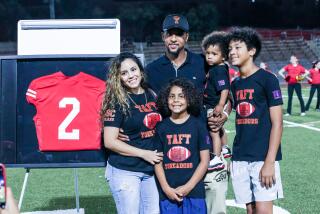Steve Scott Elected to Hall of Fame
- Share via
Middle-distance running star Steve Scott, who ran the mile in less than 4 minutes 136 times, has been elected to the National Track and Field Hall of Fame, along with pole vaulter Earl Bell, 1992 200-meter Olympic gold medalist Gwen Torrence and race walker Larry Young.
The induction ceremony will be Dec. 6 in Kansas City, Mo., for the hall of fame, which is under construction in New York is scheduled to reopen next year.
Scott, 46, won the U.S. men’s 1,500-meter title six times and the U.S. indoor mile four times. He was on three Olympic teams, finishing 10th in 1984 and fifth in 1988. He was on the Olympic team in 1980, but the United States boycotted the Games in Moscow.
He had the rare ability to blend his speed with consistency and longevity. “It’s hard to stay at that level for that long,” Scott said Wednesday.
“With injuries and illnesses, staleness, to remain in the top 10 in the world for 10 years, and consistently racing at a high level, I’d like to be known as someone that was a tough competitor.”
Scott holds the national outdoor mile record, and U.S. indoor records in the mile and 2,000 meters. As a senior at UC Irvine, he won the NCAA 1,500-meter title in 1978.
Though Scott finished 10th in the 1984 Olympics in the 1,500 meters (won by Sebastian Coe), he received special mention in “The Complete Book of the Summer Olympics” by David Wallechinsky, who wrote: “For many years, 1,500-meter races in major championships had been run as a kickers’ race, three slow laps, followed by a final sprint. Steve Scott had decided to turn the 1984 Olympics final into ‘a true miler’s race.’ In the backstretch of the second lap, he tore into the lead and forced the pace, testing the strength of the other runners.”
Scott said it was a few years before he could watch that race on tape. “It wasn’t something I had practiced or even had confidence in,” he said. “It was a tactical error. My race plan had always been to follow and move in the last 600. I wasn’t real confident in that race plan, but I felt like it was something we decided and, ‘So, by golly, I’m going to stick to it.’ ”
Scott, the track and cross-country coach at Cal State San Marcos, faced a severe medical challenge after he finished competing. He overcame testicular cancer, requiring two surgeries in 1994 and wrote a book in 1997.
More to Read
Go beyond the scoreboard
Get the latest on L.A.'s teams in the daily Sports Report newsletter.
You may occasionally receive promotional content from the Los Angeles Times.







